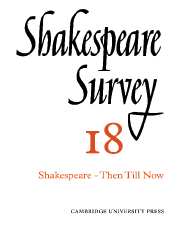Book contents
- Frontmatter
- Chiding the Plays: Then till Now
- ‘The Great Variety of Readers’
- Shakespeare’s Text—Then, Now and Tomorrow
- ‘Hamlet’ Then Till Now
- Shakespeare’s Imagery—Then and Now
- The Study and Practice of Shakespeare Production
- Shakespeare on the Screen
- Shakespeare in the Opera House
- Some Shakespearian Music, 1660–1900
- Shakespeare in America: A Survey to 1900
- International Notes
- Shakespeare Productions in the United Kingdom: 1962–4
- Three Kinds of Shakespeare: 1964 Productions at London, Stratford-upon-Avon and Edinburgh
- The Year's Contributions to Shakespearian Study 1 Critical Studies
- 2 Shakespeare’s Life, Times and Stage
- 3 Textual Studies
- Books Received
- Index
- Plate section
Chiding the Plays: Then till Now
Published online by Cambridge University Press: 28 March 2007
- Frontmatter
- Chiding the Plays: Then till Now
- ‘The Great Variety of Readers’
- Shakespeare’s Text—Then, Now and Tomorrow
- ‘Hamlet’ Then Till Now
- Shakespeare’s Imagery—Then and Now
- The Study and Practice of Shakespeare Production
- Shakespeare on the Screen
- Shakespeare in the Opera House
- Some Shakespearian Music, 1660–1900
- Shakespeare in America: A Survey to 1900
- International Notes
- Shakespeare Productions in the United Kingdom: 1962–4
- Three Kinds of Shakespeare: 1964 Productions at London, Stratford-upon-Avon and Edinburgh
- The Year's Contributions to Shakespearian Study 1 Critical Studies
- 2 Shakespeare’s Life, Times and Stage
- 3 Textual Studies
- Books Received
- Index
- Plate section
Summary
'Shakespeare is a dead issue.' Thus T. J. B. Spencer concludes his 1959 British Academy lecture. 'The resistance to his magnificent tyranny is over....' And Spencer would seem to be right on the grounds of his argument. Whether Shakespeare's work, taken as a whole, is worth the attention it has come to compel, the influence it has exerted is not now a matter for much disagreement. Even the long-fought war on Shakespeare's language, so tellingly reviewed by Spencer, has ended in something like our surrender. We hear, now, much about what Shakespeare's words are doing, little about their 'conceited' badness. Utter detraction on these and on the other classic grounds has gone, detraction, that is, of Shakespeare. But not of Shakespeare's plays.
The distinction is a just one. Issues of judgment on particular Shakespeare plays are not dead. Critics do not ordinarily go to 'Shakespeare'. They go to Troilus and Cressida or Othello or The Winter's Tale, and they still find fault. Often they find fault with interpretations of other critics, not the play. When they do, they may exhibit the 'shadow-boxing of rival bardolaters', as Spencer says. But where they make judgments against the play, or something in the play, the boxing is real. They do make such judgments, and not only against the earliest plays. There are the standard issues still active: the rejection of Falstaff, the death of Cordelia, the moral ambiguities of Antony and Cleopatra. Such matters are widely defended, subtly interpreted, and yet not settled. Shakespeare's handling of them, and not merely some critic's interpretation of it, is still questioned.
- Type
- Chapter
- Information
- Shakespeare Survey , pp. 1 - 10Publisher: Cambridge University PressPrint publication year: 1965



